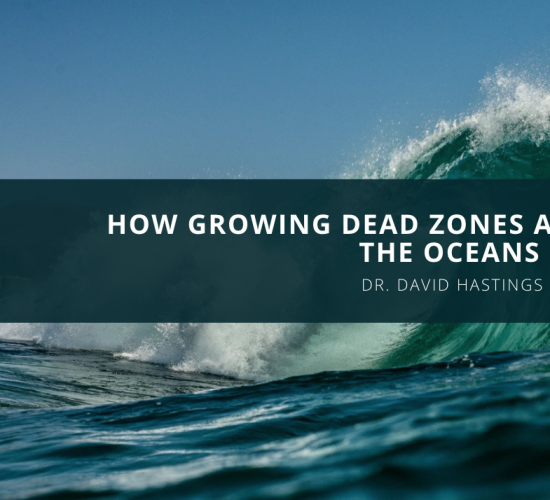Marine Science Specialist Dr. David Hastings Explains How Growing Dead Zones Are Suffocating The Oceans

Dr. David Hastings, a Florida-based marine science expert and ocean advocate outlines the increasing risk to marine life posed to the world’s oceans by dead zones.
Regions of the ocean starved of oxygen, so-called “dead zones” have more than quadrupled in size since the middle of the last century. Posing a significant risk to marine life, the dire consequences of these dead zones are becoming increasingly apparent, with some experts now pointing to much higher rates of extinction if considerable action isn’t taken to combat the problem. A chemical oceanographer and marine science expert from north central Florida, Dr. David Hastings provides professional insight into the matter.
“Areas of the ocean that are completely lacking in oxygen, commonly known as “dead zones,” have increased fourfold since the 1950s,” reveals marine science specialist Dr. David Hastings, a chemical oceanographer, marine geochemist, and retired college professor, speaking from his home in Gainesville, Florida. What’s more, the marine science expert explains, is that areas deemed to contain ‘very low’ oxygen levels have increased more than ten fold in the same period.
“The majority of marine life cannot survive in either completely anoxic (no oxygen) or very low oxygen environments,” marine science expert Dr. David Hastings explains, “and rates of extinction are 100 to 1,000 times higher than the natural rate observed in the absence of human impacts.” “Unless we take action, the situation will continue to worsen, and we are now faced with the genuine possibility of an extinction of species across vast swathes of the planet’s oceans.” “Fish can simply swim away from these dead zones, but other marine plants and animals that need oxygen to survive can not escape the lethal areas.”
According to marine science specialist Dr. David Hastings, suffocating dead zones are largely a direct result of climate change coupled with the effects of nutrient runoff from fertilizers and sewage. “The large-scale deoxygenation of our oceans that we are witnessing today stems mainly from the fact that warmer waters are able to hold less oxygen than cooler waters,” states Dr. Hastings. Most noticeable in coastal areas, the issue is further exacerbated, the marine science expert goes on to point out, by fertilizer and sewage run-off close to shore.
“Nutrient pollution is a major cause of algal blooms,” says Dr. Hastings, “and when this algae dies and begins to decompose, it sucks further vital oxygen out of the water.”
A warmer climate and, marine science expert Dr. David Hastings suggests, more and more oxygen-deficient regions in the ocean, all point toward a potential crisis for the planet’s vital marine environments if action isn’t taken. “Thankfully, much of the oxygen decline we are seeing can be managed, particularly in regards to the nutrient-driven decline in coastal areas,” reveals the retired college professor and ocean advocate. By greatly reducing the amount of nutrient runoff from agriculture and limiting the amount of sewage runoff in coastal areas, we can manage this emerging problem. For example, the extent of dead zones in the Chesapeake Bay have been declining recently, due in large part to regional efforts to limit nutrient runoff. The continuing decline in open-ocean oxygen, however, must be made a priority for governments around the world, he says, if the tide on the planet’s dead zones at sea is to be turned.
Scientists working on the problem have referred to the speed of ocean suffocation as literally breathtaking, and suggested that the need for action is, perhaps, best summarized by the American Lung Association’s famous motto. “We have likened the situation to the motto of the American Lung Association,” adds marine science expert Dr. David Hastings in closing, “saying, ‘If you can’t breathe, nothing else matters.'”
Recently retired college professor Dr. David Hastings currently resides in Gainesville, Florida.
Additional Information
- Dr. David Hastings
- Dr. David Hastings
- David Hastings